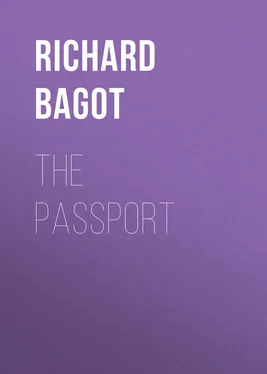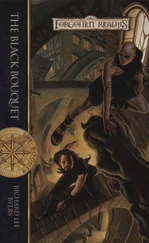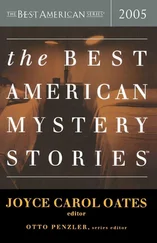Richard Bagot - The Passport
Здесь есть возможность читать онлайн «Richard Bagot - The Passport» — ознакомительный отрывок электронной книги совершенно бесплатно, а после прочтения отрывка купить полную версию. В некоторых случаях можно слушать аудио, скачать через торрент в формате fb2 и присутствует краткое содержание. Жанр: foreign_antique, foreign_prose, на английском языке. Описание произведения, (предисловие) а так же отзывы посетителей доступны на портале библиотеки ЛибКат.
- Название:The Passport
- Автор:
- Жанр:
- Год:неизвестен
- ISBN:нет данных
- Рейтинг книги:4 / 5. Голосов: 1
-
Избранное:Добавить в избранное
- Отзывы:
-
Ваша оценка:
- 80
- 1
- 2
- 3
- 4
- 5
The Passport: краткое содержание, описание и аннотация
Предлагаем к чтению аннотацию, описание, краткое содержание или предисловие (зависит от того, что написал сам автор книги «The Passport»). Если вы не нашли необходимую информацию о книге — напишите в комментариях, мы постараемся отыскать её.
The Passport — читать онлайн ознакомительный отрывок
Ниже представлен текст книги, разбитый по страницам. Система сохранения места последней прочитанной страницы, позволяет с удобством читать онлайн бесплатно книгу «The Passport», без необходимости каждый раз заново искать на чём Вы остановились. Поставьте закладку, и сможете в любой момент перейти на страницу, на которой закончили чтение.
Интервал:
Закладка:
Nor was this state of things of recent origin. Ever since the Abbé Roux had become, as it were, a member of the Montefiano household, Bianca Acorari had entertained the same feeling towards him. Her obstinacy on this point, indeed, had first awakened the princess to the fact that her step-daughter had a very decided will of her own, which, short of breaking, nothing was likely to conquer.
This stubbornness, as the princess called it, had shown itself in an unmistakable manner when Bianca, though only twelve years old, had firmly and absolutely refused to confess to Monsieur l'Abbé. In vain the princess had threatened punishment both immediate and future, and in vain the Abbé Roux had admonished her. Make her confession to him, she would not. To any other priest, yes; to him, no – not then or ever. There was nothing more to be said or done – for both the princess and Monsieur l'Abbé knew well enough that the child was within her rights according to the laws of the Church, though of course she herself was unaware of the fact. There had been nothing for it, as weeks went on and Bianca never drew back from the position she had taken up, but to give way as gracefully as might be – but it was doubtful if the Abbé Roux had ever forgiven the want of confidence in him which the child had displayed, although he had afterwards told her that the Church left to all penitents the right of choice as to their confessors.
When Bianca grew older, the princess had intended to send her to the Convent of the Assumption in order to complete her education, and at the same time place her under some discipline. The girl was delicate, however, and it was eventually decided that it was better that she should be educated at home.
Perhaps it was the gradual consciousness that she was debarred from associating with any one of her own age which had made Bianca think wistfully that it would be pleasant to make the acquaintance of the attractive-looking girl whom she passed occasionally on the staircase, and who had come to live under the same roof as herself. She could not but notice that the older she became the more she seemed to be cut off from the society of others of her years. Formerly she had occasionally been allowed to associate with the children of her step-mother's friends and acquaintances, and, at rare intervals, they had been invited to some childish festivity at Palazzo Acorari.
By degrees, however, her life had become more and more isolated, and for the last year or two the princess, a governess who came daily to teach her modern languages and music, and her maid and attendant, Bettina, had been her only companions.
Rightly or wrongly, Bianca associated the restriction of her surroundings with the influence of the Abbé Roux, and the suspicion only increased the dislike she had always instinctively borne him.
It never entered into her head, however, to suggest to the princess that her life was an exceedingly dull one. Indeed, having no means of comparing it with the lives of other girls of her age, she scarcely realized that it was dull, and she accepted it as the natural order of things. It had not been until she had seen Giacinta Rossano that an indefinable longing for some companionship other than that of those much older than herself began to make itself felt within her, and she had found herself wondering why she had no brothers and sisters, no cousins, such as other girls must have, with whom they could associate.
In the mean time, life in Palazzo Acorari went on as usual for Bianca. She fancied that, when they passed each other, the daughter of the mysterious old professor on the second floor who wrote wicked books looked at her with increasing interest; and that once or twice, when Bianca had been accompanied only by Bettina, she had half-paused as though about to speak, but had then thought better of it and walked on with a bow and a slight smile.
On one occasion she had ventured to sound Bettina as to whether it would not be at least courteous on her part to do something more than bow as she passed the Signorina Rossano. But Bettina was very cautious in her reply. The princess, it appeared, had been resolute in forbidding any communication between the two floors, excepting such as might have to be carried on through the medium of the porter, in the case of such a calamity as pipes bursting or roofs leaking.
December was nearly over, and Rome was sotto Natale . People were hurrying through the streets buying their Christmas presents, and thronging the churches to look at the representations of the Holy Child lying in the manger of Bethlehem; for it was Christmas Eve, and the great bells of the basilicas were booming forth the tidings of the birth of Christ. In every house in Rome, among rich and poor alike, preparations were going on for the family gathering that should take place that night, and for the supper that should be eaten after midnight when the strict fast of the Christmas vigil should be over.
The majority, perhaps, paid but little heed to the fasting and abstinence enjoined by the priests, unless the addition of fresh fish to the bill of fare – fish brought from Anzio and Nettuno the day before by the ton weight and sold at the traditional cottìo throughout the night – could be taken as a sign of obedience to the laws of the Church. But the truly faithful conformed rigidly throughout the day, reserving themselves for the meats that would be permissible on the return from the midnight masses, when the birth of a God would be celebrated, as it has ever been, by a larger consumption than usual of the flesh of His most innocent creatures on the part of those who invoke Him as a merciful and compassionate Creator.
This particular Christmas Eve it so happened that the princess was confined to her bed with a severe cold and fever, which made attendance at the midnight masses an impossibility so far as she was concerned. Bianca, however, was allowed to go, accompanied by Bettina, and shortly after half-past eleven they left Palazzo Acorari, meaning to walk to the church of San Luigi dei Francesi in the Piazza Navona, one of the few churches in Rome to which the public were admitted to be present at the three masses appointed to be said at the dawning hours of Christmas Day.
It was raining in torrents as they emerged from the portone of the palazzo , and to get a cab at that hour of night on Christmas Eve appeared to be an impossibility, except, perhaps, in the main streets.
Bianca and her attendant consulted together. They would certainly be wet through before they could reach the Piazza Navona, and it seemed as though there was nothing to be done but to remain at home. Bettina, however, suddenly remembered that at the little church of the Sudario, less than half-way to the Piazza Navona, the midnight masses were also celebrated. To be sure, it was the church of the Piedmontese, and chiefly attended by members of the royal household, and often by the queen herself. The princess would not be altogether pleased, therefore, at the substitution; but, under the circumstances, Bianca expressed her determination of going there, and her maid was obliged to acquiesce.
Five minutes plunging through puddles and mud, and battling with a warm sirocco wind which blew in gusts at the corners of every street, brought them to the little church hidden away behind the Corso Vittorio Emmanuele.
A side door communicating with the building was open, and they passed from the darkness and the driving rain into a blaze of warm light and the mingled scent of incense and flowers. The high altar, adorned with priceless white-and-gold embroideries, sparkled in the radiance of countless wax-candles. Overhead, from a gallery at the opposite end of the church, the organ was playing softly, the player reproducing on the reed-stops the pastoral melodies of the pifferari , in imitation of the pipes of the shepherds watching over their flocks through that wonderful night nineteen centuries ago.
Читать дальшеИнтервал:
Закладка:
Похожие книги на «The Passport»
Представляем Вашему вниманию похожие книги на «The Passport» списком для выбора. Мы отобрали схожую по названию и смыслу литературу в надежде предоставить читателям больше вариантов отыскать новые, интересные, ещё непрочитанные произведения.
Обсуждение, отзывы о книге «The Passport» и просто собственные мнения читателей. Оставьте ваши комментарии, напишите, что Вы думаете о произведении, его смысле или главных героях. Укажите что конкретно понравилось, а что нет, и почему Вы так считаете.












